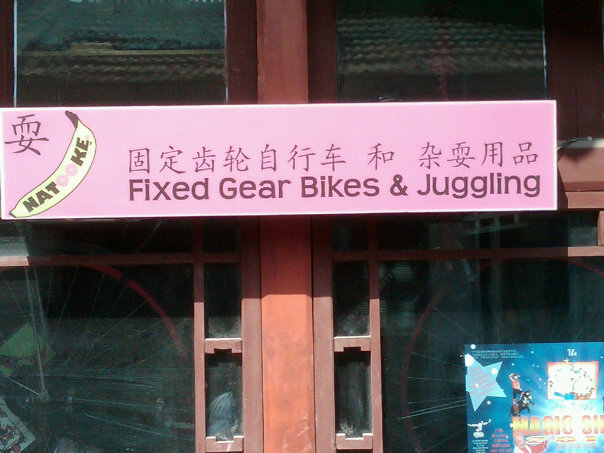
Are there any hipsters in China? That’s the question David Goodman confronts in a recent article for Slate. To frame the debate, he looks at the fashion for fixed-gear bikes, and wonders why come, in a country where everyone bicycles, there is virtually no fixie movement.
The question is, I think, at least semi-facetious, but it is a good way of getting at the real issue, which is whether there is any kitsch in China, and if so, of what sort. The conclusion is that while there is kitsch of a sort (Mao kitsch, in particular), there is no ironic playing with the signs and symbols of poverty, which is so central to the hipster worldview. Goodman has this great quotation from a sociology prof who says, "There is a saying in Chinese: 'Laugh at the poor, not the prostitutes,'".
By this, I gather he means that in China, the shame is in being poor, not in how you make your money. In such a culture, there is no room for nostalgie de la boue, there’s only the absolute shame of the dirt on your pants. You simply can’t “play” with being poor, because no one will get it.
Is this an accurate take on Chinese culture? I have no idea. One possibility is that China is still at an earlier stage of economic development, where conspicuous consumption has not yet become conspicuous authenticity. Once China gets rich enough, and bikes get scarce enough, the kids will get with the insta-irony/nostalgia/hipster/kitsch program.
Another possibility is that there is no romantic strain in Chinese culture that could underwrite a counter-progress movement, even an ironic one. In which case, China’swill always be a far more straightforwardly materialistic society than ours here in the West, since they don’t share any of the shame about consumption and brands that motivates so much hipster irony. Again, I don’t know enough about Chinese culture to know. Anyone have any thoughts? Send me an email.
Meanwhile, this story might serve as a counterexample to the entire thesis.
 Wednesday, May 25, 2011 at 08:56PM
Wednesday, May 25, 2011 at 08:56PM 




